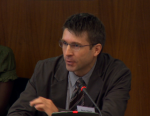Jean-Marie BIJU-DUVAL
contribution 07 -
Biju-Duval Jean-Marie

tags
Trial in absentiatranstlated version
Thank you, Mr. Chairman. I would like to say a word on that point. In the legal arena we know that there are judicial fictions that are quite useful. Others appear very futile or even dangerous to me. Trial in absentia, in my opinion, seems to fall in the latter category. We all know that in our system trial in absentia actually exists, but we are aware of its limits and its value. We are clear headed enough to know that trial in absentia has really nothing to do with a proper trial because of the lack of adversarial inter parties proceeding.
It may be exaggerated to put it that way, but I will try to go ahead to facilitate the understanding. I feel that essentially trial in absentia is only some ritual staging of a programmed conviction, and so it has no close link with what we may consider to be justice, and it is in no way related to the discovery of the truth.
From that double perspective, I consider it futile to proceed with this particular means of completing the trials on genocide. That particular means of completing the trials on genocide would be really, really futile and quite disturbing. It will be futile because a trial in absentia and conviction by absentia will really add nothing to the arrest warrant already in existence. I don’t see how a judgment in absentia without any adversarial proceeding can add to the statements made in the arrest warrant. That, Mr. Chairman, is my opinion on trial in absentia.
Andrew CLAPHAM
Thank you. That was quite clear.
Bernard MUNA
I think that, once again, we are just looking at a trial and looking at the parties as being the accused and the Prosecution. From what my colleague has said, Mr. Duval, he is only looking at the accused and the Prosecution. But, as I said yesterday, there are many other parties. There is the Rwandan society. There are the witnesses. There are the victims. A trial in absentia at least would bring a partial closure. It may be a non process to the accused person, I agree, but at least it would be a closure to the witnesses, the Rwandan society, the victims. And therefore it is not going to be useless. It’s going to be very, very helpful in bringing partial closure. That is just my own addition.
Andrew CLAPHAM
I think we’re obviously not going to be able to resolve it to everybody’s satisfaction today, but I think we’ve got the main issues and the main arguments out on the table. I had also a request from Thierry Cruvellier on the question of transfers.

